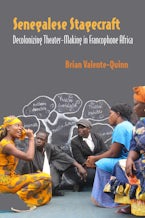Senegalese Stagecraft explores the theatrical stage in Senegal as a site of poetic expression, political activism, and community engagement. In their responses to the country’s colonial heritage, as well as through their innovations on the craft of theater‑making, Senegalese performers have created an array of decolonizing stage spaces that have shaped the country’s theater history. Their work has also addressed a global audience, experimenting with international performance practices while proposing new visions of the role of culture and stagecraft in society.
Through a study of the innovative work of Senegalese theater-makers from the 1930s onward, Senegalese Stagecraft explores a wide range of historical contexts and themes, including French colonial education, cultural Pan‑Africanism, West African Sufism, uses of television and mass media, and popular theater and activism. Using a multidisciplinary approach that includes field, archival, and literary methods, Valente‑Quinn offers a fresh look at performance cultures of West Africa and the Global South in a book that will interest students and scholars in African, Francophone, and performance studies.

